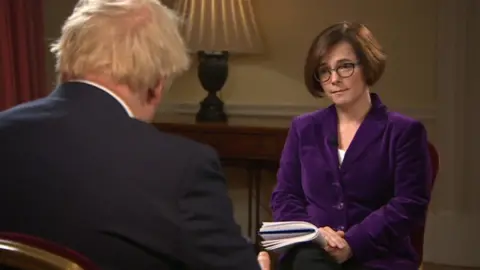Boris Johnson defends comments about murdered MP Jo Cox
Boris Johnson has defended comments he made about the late MP Jo Cox, after criticism from senior Welsh Tories.
The prime minister angered many MPs by using words such as "surrender" and "betray" as he addressed the Commons.
A Labour MP mentioned Ms Cox's murder as she criticised the PM's language but he called her intervention "humbug".
Mr Johnson also defended his use of the term "Surrender Act" to describe the law opposition MPs have passed to prevent a no-deal Brexit.
The law, known as the Benn bill, forces ministers to ask for an extension to the 31 October Brexit deadline, if there has been no agreement on the UK's terms if departure from the EU by 19 October, unless MPs have approved a no-deal Brexit.
Speaking to BBC Wales political editor Felicity Evans, he said threats to female MPs had become all "too commonplace", that this had to stop, and the language of politics had become "very personalised".
But a number of politicians, including former Welsh secretary Stephen Crabb, have called for Mr Johnson to apologise, after he said on Wednesday that the best way to honour Jo Cox - the MP who was murdered during the 2016 EU referendum campaign - was to "get Brexit done".
Mr Crabb, Conservative MP for Preseli Pembrokeshire, said he was "shocked" at the comments made by the prime minister, and that he had "a duty to reduce the level of poison in our politics".
Senior Tory AM David Melding called the commons session "one of the darkest and most destructive", describing Mr Johnson's performance, and that of Attorney General Geoffrey Cox, as "angry and obdurate".
Mr Melding, a former deputy assembly presiding officer, said on Twitter: "Intemperate language on the verge of anti-parliamentary issued forth in a vituperation [bitter and abusive language] and contempt."
Since Wednesday's exchange in the commons, many MPs are concerned that the language used could invoke hatred towards politicians
But the Conservative MP for Monmouth David Davies defended Mr Johnson, saying he thought Labour was wrong to raise Jo Cox's name in connection with the debate.
"I thought that Labour were wrong to raise Jo Cox's name in connection with this debate and I felt they were trying to use her brutal and disgraceful murder as a means to try and shut down debate some time afterwards about Brexit," he said.
"I thought Boris was right... Conservative MPs do face a huge amount of abuse, sometimes from masked protestors, and we don't need to be told about the importance of the use of language by Labour."
Mr Johnson acknowledged that threats to all MPs was something "we must make sure we stop and stamp out".
'Cautiously optimistic'
The First Minister, Mark Drakeford on Thursday accused the prime minister of "deliberately stoking the politics of division" in "our already deeply divided country".
Mr Johnson also rejected criticism of his handling of Brexit, saying the UK government was working hard to get a deal, that there "may be consequences" if Britain comes out without a deal, but that would be "nothing like as bad as some people said".
When asked how likely it was he would get a deal, he said he was not "excessively confident", but "cautiously optimistic".
He said voters could trust him, but he had been made prime minister at a "difficult time".
He said "It is vital to get Brexit done, because that is the way to put this whole thing behind us".
Mr Johnson was speaking ahead of the Conservative Party conference in Manchester. MPs have rejected the UK government's request for a three day recess to enable Tory MPs to attend.

Analysis by Felicity Evans, BBC Wales political editor

The prime minister was cheerful and confident when I met him in Downing St, despite the swathe of criticism of his language in the Commons.
He insists there's a difference between taking seriously the abuse directed at female MPs, and using terms like "Surrender Act" to describe the legislation that opposition MPs have passed to try to stop a no deal exit at the end of October.
As the party heads to conference in Manchester, the strategy is clear.
The PM wants to be seen as the one fighting the establishment to deliver Brexit.
The big question is, do voters see it that way?
Though there's no general election imminent, it does feel like we won't have to wait too long to find out.
